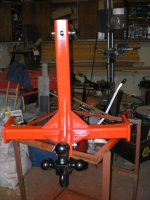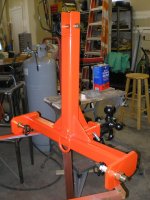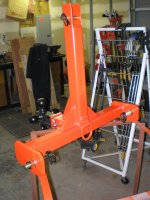6011Artist
Gold Member
- Joined
- Aug 17, 2008
- Messages
- 375
- Location
- Darlington, SC
- Tractor
- 1957 Ferguson 35, 1977? Yanmar 2200, 1963 Cub Cadet Original
Ken, your hitch looks good. I think every tractor owner needs one if dealing with trailers on his property. I have about 6, one for about every need and find it much easier to move them around with the tractor, especially if doing work around my 5 acres. Cutting grass is easier when moving trailers with tractor.
I did not put safety chain hooks/rings on mine. Didn't see the need just working off road. The restraining chain sounds good if you are going to use it with dumping but most trailers have enough tongue weight not to need that either. I try to keep it simple.
I built my first one from scratch like you did, used 3" x 1/4" tubing. I have even moved small (12X 40) mobile homes with a 70 HP tractor and a 2 5/16 ball. I later built one that is lighter using a piece of 2 1/2" x 1/4" angle iron for the main spread then putting a 2" tubing upright and a mobile home spring hanger bracket (drilled out bigger) for the top link reciever bracket. Butt weld the reciever tube and weld on the lift arm pins, light weight but strong enough to move a loaded 5' x 10' trailer.
A friend owns a welding shop and gets reciever style hitches from a car dealer that takes them off prior to sending cars/trucks to auction. He sells them to me for 5 bucks each, cheaper than the factory reciever tube, add pins, upright and bracket for top link and in 30 min I can have a new hitch. It sure beats the 150.00 or so they sell for.
After using it for just trailers, I built 3 rakes, (root rake using teeth from a box blade, hay rake from old mule drawn rake and section harrow, bought teeth for 59 cents each) that attatch to tractor using my "reese hitch". I already bought the teeth to build a leaf/pinestraw rake using hay rake teeth and I will use the reciever hitch for that as well. No need to build the 3ph on the rake, just slide it in the reciever. Another simple build. I made an upright boom pole leaning about 30 degrees out, 2' long, to drag trees with, shorter so it will pick up more weight, a fence wire bracket to hold a roll of wire, use it with a pickup "carry all", and even slid a hitch in it , backed up to my yanmar that had been sitting and pulled it in the shop like a wrecker using my Ferguson as the towing tractor. The front weight bracket served perfect as my front hitch to pick up with a trailer ball. I have a rig built to carry my acetylene torch with a boom truck (no wheels) and plan on adding a piece of tubing to it to carry my torch from same hitch with tractor. No forks yet but thay are coming.
The little reciever hitch you have built will work for all kinds of applications. Just slide in a piece of tubing and build it from there.
The only thing I did to my heavy one that you haven't added to yours was a piece of 2" flat bar about a foot long standing straight up from the reciever tube to the top link upright. I thought it would brace the two against each other. Must have worked, mobile homes did not bend it. That brace was brought out about 3 inches and leaned into upright.
Also, I use a 1 7/8 ball on the tractor. Most of my hitches are 2" or 2 5/16. Smaller ball allows tractor to pull ball out of hitch and I never have to get off of tractor unless moving a block under jack.
I did not put safety chain hooks/rings on mine. Didn't see the need just working off road. The restraining chain sounds good if you are going to use it with dumping but most trailers have enough tongue weight not to need that either. I try to keep it simple.
I built my first one from scratch like you did, used 3" x 1/4" tubing. I have even moved small (12X 40) mobile homes with a 70 HP tractor and a 2 5/16 ball. I later built one that is lighter using a piece of 2 1/2" x 1/4" angle iron for the main spread then putting a 2" tubing upright and a mobile home spring hanger bracket (drilled out bigger) for the top link reciever bracket. Butt weld the reciever tube and weld on the lift arm pins, light weight but strong enough to move a loaded 5' x 10' trailer.
A friend owns a welding shop and gets reciever style hitches from a car dealer that takes them off prior to sending cars/trucks to auction. He sells them to me for 5 bucks each, cheaper than the factory reciever tube, add pins, upright and bracket for top link and in 30 min I can have a new hitch. It sure beats the 150.00 or so they sell for.
After using it for just trailers, I built 3 rakes, (root rake using teeth from a box blade, hay rake from old mule drawn rake and section harrow, bought teeth for 59 cents each) that attatch to tractor using my "reese hitch". I already bought the teeth to build a leaf/pinestraw rake using hay rake teeth and I will use the reciever hitch for that as well. No need to build the 3ph on the rake, just slide it in the reciever. Another simple build. I made an upright boom pole leaning about 30 degrees out, 2' long, to drag trees with, shorter so it will pick up more weight, a fence wire bracket to hold a roll of wire, use it with a pickup "carry all", and even slid a hitch in it , backed up to my yanmar that had been sitting and pulled it in the shop like a wrecker using my Ferguson as the towing tractor. The front weight bracket served perfect as my front hitch to pick up with a trailer ball. I have a rig built to carry my acetylene torch with a boom truck (no wheels) and plan on adding a piece of tubing to it to carry my torch from same hitch with tractor. No forks yet but thay are coming.
The little reciever hitch you have built will work for all kinds of applications. Just slide in a piece of tubing and build it from there.
The only thing I did to my heavy one that you haven't added to yours was a piece of 2" flat bar about a foot long standing straight up from the reciever tube to the top link upright. I thought it would brace the two against each other. Must have worked, mobile homes did not bend it. That brace was brought out about 3 inches and leaned into upright.
Also, I use a 1 7/8 ball on the tractor. Most of my hitches are 2" or 2 5/16. Smaller ball allows tractor to pull ball out of hitch and I never have to get off of tractor unless moving a block under jack.
Last edited:



